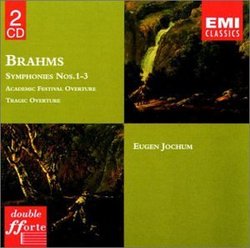| All Artists: Johannes Brahms, Eugen Jochum, London Philharmonic Orchestra Title: Brahms: Symphony Nos.1-3/Tragic Overture,Op.81/Academic Festival Overture,Op.80 Members Wishing: 0 Total Copies: 0 Label: EMI Classics Imports Release Date: 2/18/1997 Genre: Classical Style: Symphonies Number of Discs: 2 SwapaCD Credits: 2 UPC: 724356951525 |
Search - Johannes Brahms, Eugen Jochum, London Philharmonic Orchestra :: Brahms: Symphony Nos.1-3/Tragic Overture,Op.81/Academic Festival Overture,Op.80
 | Johannes Brahms, Eugen Jochum, London Philharmonic Orchestra Brahms: Symphony Nos.1-3/Tragic Overture,Op.81/Academic Festival Overture,Op.80 Genre: Classical
The same London Philharmonic that sounds bored out of its collective mind on Wolfgang Sawallisch's Brahms cycle here seems to be playing on the edge of its seat. Eugen Jochum's much more positive direction is certainly at ... more » |
Larger Image |
CD DetailsSynopsis
Amazon.com The same London Philharmonic that sounds bored out of its collective mind on Wolfgang Sawallisch's Brahms cycle here seems to be playing on the edge of its seat. Eugen Jochum's much more positive direction is certainly at least partially responsible. He's a tremendously inspiriting Brahms conductor, and these are performances full of fire and passion. The Fourth Symphony comes separately, coupled with Klaus Tennstedt's German Requiem, and at the twofer price, these are four CDs not to be missed. --David Hurwitz Similar CDs
|
CD ReviewsCompelling Brahms 03/31/2000 (5 out of 5 stars) "Jochum's readings of the first three Brahms Symphonies are lithe, sinewy performances with flexible tempi and phrasing that seem almost to presage the practices of the 'authentic' performers. Compared to Szell in this repertoire, for example, I find these Jochum readings to be just a bit less complacent, more heterogeneous and more spontaneous. Incisiveness is not Jochum's main objective (Furtwangler was Jochum's mentor, after all) while expressive leeway is. In the First Symphony, Jochum is not afraid to whip up a tempo here and there, the coda of the Finale of the First Symphony being a good example. Some of the dynamic crescendos in the slow movement take one by surprise initially but come to seem natural after repeated hearings. By contrast, Jochum paces the third movement so that the climax does not run away from him.The natural way in which the first movement of the Second Symphony unfolds is totally disarming. There's charm here balanced with virility and Jochum does not hesitate to bend tempi to increase expressive effect. On first hearing, the Finale of the Second Symphony seems to be a bit lightweight but the tempo is Allegro con spirito and Jochum is content to let the music speak for itself without imposing any preconceived heroism.In the Third Symphony, the relative shortness of phrasing (compared with Szell) is apparent throughout. There's less of a heroic stride here than with Szell but more litheness and spontaneity. The relative objectivity of the third movement is most striking. Among versions that I've heard, Bruno Walter's seems closest to Jochum's approach to this symphony although Jochum is more volatile.In total, these performances are hard to resist. Given the excellence of the remastered analogue and the fine performances of the two overtures, this is a highly recommendable, nay, essential reissue." Revelatory performances, excellent sonics, too 02/19/1999 (5 out of 5 stars) "Jochum's stereo Brahms cycle is stunningly beautiful, and makes me curious to hear his mono set from the early 50s. The Walter and Solti Brahms cycles are classics, but Jochum's is right up there, and the sound is outstanding. His tempos are just different enough to be interesting and make you hear the music in a new way, without being eccentric. Highly recommended, especially at the reasonable price." A Take-no-prisoners Brahms cycle... Joey Joe Joe Jr. Shabadoo | Boston, MA USA | 12/09/2005 (5 out of 5 stars) "Great set. I just picked this up from Amazon, and I must say I am quite pleased. Jochum's direction is, quite simply, electrifying. I would say the 3rd is definitive, and the 1st and 2nd are up there with the other great interpretations. The 4th (on this disc's pair in the catalogue) is very good, but not quite to the same level as these 3. I have never heard anyone take the third that quickly and fearsomely, and the same can be said for the coda in the finales of Symphony No.1 and Symphony No.2. Just a brilliant trilogy, with the fourth paired with Ein Deutsches Requiem on another EMI two-fer. I would recommend this set to anyone who likes lushness, density and beautiful string sonorities first and foremost with their Brahms. Add to those qualities impeccable interpretation from an old master from a different time, and you've got a winner. I would highly recommend both two-fers to complete the cycle."
|

 Track Listings (6) - Disc #1
Track Listings (6) - Disc #1



